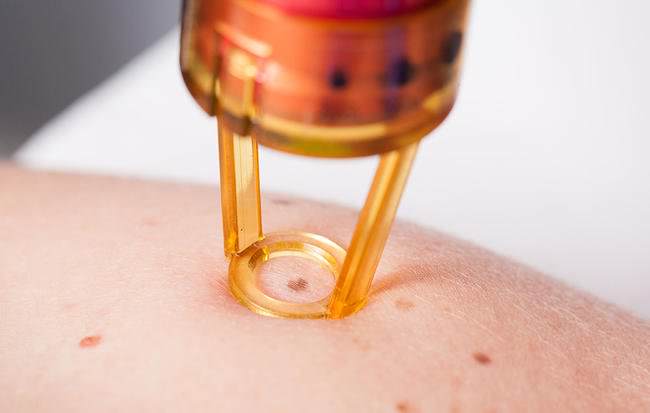This Woman Posted A Graphic Video Showing How Skin Cancer Destroyed Her Nose

"Grieving my lost nose has been harder than it sounds."
In June of 2014, Marisha Dotson, a 28-year-old from Knoxville, Tennessee noticed that a red spot on her nose had turned into something resembling a pimple. She went to a health clinic because she didn't have insurance and was told it was an infection, she writes on her GoFundMe page. But after the bump because painful a few weeks later, she used her last paycheck and borrowed money from a friend in order to cover the cost of a visit to the dermatologist. That's when she was diagnosed with an “extremely aggressive squamous cell carcinoma on my nose. The tumor was growing at an alarming rate,” she writes.
Marisha says she's undergone seven major surgeries over the past 15 months to fight the cancer. "Over half my nose, cartilage, and nasal tissues were removed," she writes.
The surgeries took a brutal toll on her face: “Surgeons removed the bone in my hard palette, I lost eight teeth, my sinus cavity, and tissue from under my eye and there is also a huge gap on the left side of my face,” she told the DailyMail, adding that she had less than a 20 percent chance of survival. Happily, she says that follow-up testing revealed she is now cancer-free.
There are about 700,000 cases of squamous cell carcinoma in the U.S. every year, according to the American Academy of Dermatology (AAD). According to the Skin Cancer Foundation, it often appears as scaly red patches, open sores, or elevated growths on the skin that crust or bleed. While squamous cell carcinoma can spread to other parts of the body, the AAD notes that when discovered early, the disease is usually highly treatable.
Like other skin cancers, squamous cell carcinoma develops from sun exposure, so protecting yourself from UV rays is key. Apply one ounce of an SPF 30 sunscreen to all exposed areas of your body every two hours or after swimming or sweating, recommends the American Academy of Dermatology. Wear a wide-brimmed hat and sunglasses, and seek shade when you’re out. Oh, and never use a tanning bed. The AAD also recommends checking your partner and yourself for skin cancer regularly.
Great article